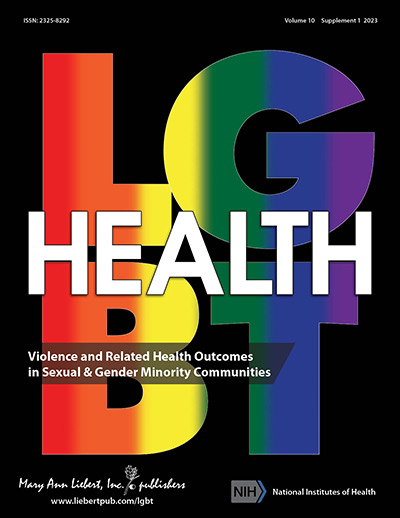Announcements
-
Special Article Collection
National Minority Health Month - Read Now
Aims & Scope
LGBT Health is the premier peer-reviewed journal dedicated to promoting optimal healthcare for all sexual and gender minority persons worldwide. The Journal focuses specifically on health while maintaining sufficient breadth to address policy, legislative, and education and training issues relevant to the provision of healthcare and health outcomes. This Journal aims to advance understanding of the health needs particular to each sexual and gender minority population and to improve delivery of and access to culturally competent healthcare. LGBT Health also encourages further research and increased funding in this critical but currently underserved domain. The Journal is an authoritative source of information and provides an international forum for the most recent developments in health research, clinical practice, and policy. Contributions from all continents are solicited including Asia and Africa which are currently underrepresented in LGBT health research.
LGBT Health facilitates and supports the efforts of researchers, clinicians, academics, and policymakers to eliminate barriers to healthcare and expand options for prevention and treatment with the aim of improving health outcomes for all LGBT and other sexual and gender minority populations.
Priority is given to data-driven research articles that have direct implications for improving clinical practice and access to care, and reducing health disparities. It is imperative that LGBT and other sexual and gender minority populations are considered as distinct groups rather than combined as a single entity. Similarly, bisexual and transgender populations should not be grouped across gender. Gender assessment should include a two-step method that considers both natal gender (gender assigned at birth) and current gender identity.
LGBT Health coverage includes:
- Evidence-based clinical best practices and guidelines
- Clinical care and decision-making support for all sexual and gender minority individuals including those with somatic intersex conditions and other variations of sex development and, when relevant, their families
- Development of appropriate methods and measures to collect and analyze sexual orientation and gender identity data
- Cancer risks, prevention, and screening behaviors, barriers to diagnosis and treatment, survivorship, and end-of-life care
- Cardiovascular disease and other chronic conditions
- HIV/AIDS and other STIs – risk behaviors, testing, prevention, and treatment services
- Sexual and reproductive health including assisted reproduction
- Overweight, obesity and eating disorders
- Transgender specific healthcare: Routine clinical care, assessments for and provision of gender affirming treatments and procedures; longitudinal follow-up studies including the health consequences of long-term gender affirming hormone use
- Development, implementation, and evaluation of tailored and culturally appropriate prevention and treatment interventions
- Health disparities and needs across the life course
- Intersectionality among race, ethnicity, socioeconomic status, geographic location, and sexual and gender minority status
- Impact of stigma, discrimination, and violence on mental and physical health
- Substance use and abuse (alcohol, tobacco, and other drugs)
- LGBT healthcare in the primary care setting
- Professional medical education and training in LGBT health
- Access to healthcare services and health insurance coverage
The Journal publishes original research, reviews, clinical reports, perspectives in all of the areas identified above, and select book reviews.
LGBT Health is under the editorial leadership of Editor-in-Chief William Byne, MD, PHD, Columbia University, New York, NY. View the entire editorial board.
Audience: All healthcare providers and researchers with an interest in sexual and gender minority health as well as policy makers and advocates for equality in healthcare for LGBT and other sexual and gender minority populations. This includes physicians and physician assistants of all disciplines, nurses and nurse practitioners, social workers and psychologists as well as researchers in any relevant area of the health sciences, including basic, translational, and clinical studies; population studies; social sciences, and medical anthropology.
Watch an important video message from Editor-in-Chief William Byne, MD, PhD:
Indexing/Abstracting:
- PubMed/MEDLINE
- PubMed Central
- Web of Science: Social Sciences Citation Index™ (SSCI)
- Scopus
- Current Contents®/Clinical Medicine
- Current Contents®/Social & Behavioral Sciences
- Journal Citation Reports/Science Edition
- Journal Citation Reports/Social Sciences Edition
- PsycINFO
- CAB Abstracts
- Global Health
- SafetyLit
- BenchSci

